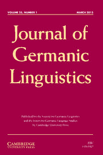
Journal of Germanic Linguistics
Scope & Guideline
Innovating Research in Germanic Language Studies
Introduction
Aims and Scopes
- Phonology and Morphology:
The journal frequently publishes research on phonological and morphological aspects of Germanic languages, exploring sound systems, word formation, and their historical developments. - Grammaticalization and Syntax:
A significant focus is on grammaticalization processes and syntactic structures, including studies on word order variation and the evolution of grammatical constructions. - Sociolinguistics and Variation:
The journal highlights sociolinguistic perspectives, examining language variation, dialectal differences, and the social factors influencing language use in Germanic contexts. - Historical Linguistics:
Research on historical linguistics is prominent, with a substantial body of work dedicated to diachronic studies of language change, including grammatical gender, case systems, and language contact phenomena. - Cross-Linguistic Studies:
The journal also emphasizes comparative studies across different Germanic languages, providing insights into typological similarities and differences.
Trending and Emerging
- Grammaticalization Processes:
There has been an increasing focus on grammaticalization, particularly in how grammatical structures evolve over time in different Germanic languages, highlighting the dynamic nature of linguistic change. - Variationist Sociolinguistics:
The rise of variationist sociolinguistics is evident, with more studies examining language use in social contexts, including intensifiers and gender assignment, which provide insights into contemporary linguistic practices. - Corpus-Based Analyses:
The use of corpus linguistics as a methodological approach has gained traction, allowing for data-driven investigations of language structure and usage, which enhances the empirical foundation of studies. - Psycholinguistic Perspectives:
Emerging themes in psycholinguistics, particularly regarding language processing and acquisition, are becoming more prominent, suggesting a growing interest in the cognitive aspects of language use. - Diachronic Studies of Gender and Case:
There is a notable trend towards diachronic studies focusing on grammatical gender and case marking, examining their historical changes and implications across various Germanic languages.
Declining or Waning
- Poetry and Literary Analysis:
The analysis of poetic structures and their grammatical implications has become less frequent, suggesting a waning interest in literary linguistics within the journal. - Experimental Studies in Language Acquisition:
Although experimental approaches to language acquisition were more prominent in earlier publications, recent volumes show a decrease in this methodological focus, indicating a potential shift towards more observational or corpus-based studies. - Regional Dialect Studies:
Research specifically targeting regional dialects has been less prevalent, possibly reflecting a broader trend towards more generalized sociolinguistic studies rather than localized investigations. - Language Contact Studies:
While language contact has historically been a topic of interest, the frequency of studies focusing on this area has diminished, suggesting a narrowing scope in exploring multilingual interactions within Germanic contexts.
Similar Journals

Journal of Comparative Germanic Linguistics
Fostering Interdisciplinary Dialogue in LinguisticsThe Journal of Comparative Germanic Linguistics, published by SPRINGER, is a leading peer-reviewed academic journal that has significantly contributed to the fields of linguistics and arts and humanities since its inception. With an impressive impact factor and consistently ranked in the Q1 category in both Arts and Humanities (miscellaneous) and Linguistics and Language, this journal serves as a vital platform for scholars to disseminate their research on comparative studies in Germanic languages. The journal's scope encompasses a broad range of topics, fostering an interdisciplinary dialogue that enhances our understanding of language development, structure, and evolution. Although currently not an open-access journal, the Journal of Comparative Germanic Linguistics ensures that its high-quality articles reach a global audience, appealing to researchers, professionals, and students who are keen to explore the nuances of Germanic linguistics. With its strategic address in the Netherlands, the journal stands at the forefront of linguistic research, providing valuable insights that contribute to the academic community's knowledge base.
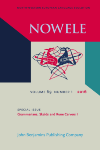
NOWELE-North-Western European Language Evolution
Exploring the Evolution of Language DynamicsNOWELE-North-Western European Language Evolution, published by John Benjamins Publishing Co, serves as a vital platform for researchers and scholars interested in the evolution and dynamics of North-Western European languages. With an ISSN of 0108-8416 and an E-ISSN of 2212-9715, this journal has been contributing to the field of linguistics since its inception in 1983, with ongoing publications until 2024. Indexed in Scopus and classified in the Q3 category for Linguistics and Language, NOWELE is recognized for its rigorous academic standards and diverse contributions, ranking #485 out of 1088 in the Arts and Humanities category, and #566 out of 1167 in Social Sciences. The journal fosters an open dialogue within the linguistic community, presenting innovative research findings and theoretical advancements. Researchers, professionals, and students alike benefit from its systematic exploration of language evolution in the context of a rapidly changing global linguistic landscape.
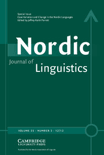
Nordic Journal of Linguistics
Connecting scholars through innovative linguistic studies.Nordic Journal of Linguistics, published by Cambridge University Press, serves as a prominent platform for the dissemination of cutting-edge research in the field of linguistics. Established in 1978 and spanning over four decades, the journal has curated a rich repository of scholarly work that reflects the dynamic and evolving nature of language studies. With an impressive Q2 ranking in both the Linguistics and Language category and a commendable performance in Scopus rankings, placing it at the 74th percentile among Arts and Humanities, the journal is recognized for its high academic standards and impact on contemporary linguistic research. Scholars and practitioners can access a variety of studies that delve into different languages, linguistic theories, and methodologies, fostering broader understanding and dialogue within the linguistic community. Although the journal does not currently offer open-access options, it remains an invaluable resource for researchers, professionals, and students keen on advancing their knowledge of language and linguistics.

Glossa-A Journal of General Linguistics
Elevating Linguistic Research for a Global AudienceGlossa: A Journal of General Linguistics, published by the Open Library of Humanities, stands as a leading voice in the realm of linguistic research since its inception in 2016. With its Q1 category ranking in Linguistics and Language and impressive Scopus ranks encompassing the top 83rd and 81st percentiles in its respective fields, Glossa fosters a vibrant academic community committed to the rigorous exploration of language and linguistic theory. Operating under an open access model, the journal not only enhances the visibility of groundbreaking research but also ensures that valuable insights are accessible to a global audience. The journal's commitment to interdisciplinary dialogue makes it an indispensable resource for scholars, professionals, and students eager to engage with contemporary developments in linguistics. As it converges into 2024, Glossa continues to champion innovative scholarship and critical discourse that challenges conventional boundaries within the field.
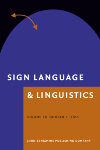
Sign Language & Linguistics
Connecting Scholars in the World of Sign LinguisticsSign Language & Linguistics is an esteemed academic journal published by John Benjamins Publishing Co, dedicated to advancing the field of sign language studies and linguistics. With an ISSN of 1387-9316 and an E-ISSN of 1569-996X, this journal has earned a prominent place in the linguistic community, achieving a Q1 ranking in both the Linguistics and Language category, and standing out within the Scopus rankings, placing in the 77th percentile among the Arts and Humanities and 75th percentile in the Social Sciences categories. Sign Language & Linguistics spans over two decades of research, offering comprehensive insights and analyses from 1998 to 2024, promoting high-quality scholarly communication. Aimed at researchers, professionals, and students alike, this journal is essential for those exploring the intersection of sign languages, linguistics, and cultural studies, facilitating progressive discourse and fostering an understanding of this vital mode of human communication.
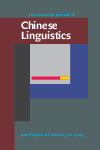
International Journal of Chinese Linguistics
Connecting Scholars in the Realm of Chinese LanguageInternational Journal of Chinese Linguistics is a distinguished publication that delves into various aspects of linguistic studies pertaining to the Chinese language. Published by John Benjamins Publishing Co, this journal stands out for its commitment to advancing the knowledge and understanding of Chinese linguistics within the global academic community. With an impact factor that places it in the Q2 quartile of linguistics and language, the journal is indexed in prominent databases, achieving ranks of #501 in Arts and Humanities and #580 in Social Sciences. These rankings reflect the journal's dedication to maintaining high scholarly standards and its relevance in both linguistic research and practical applications. While not categorized as Open Access, the journal provides necessary access through institutional subscriptions, thereby ensuring that valuable research reaches a broad audience. Covering a wide range of topics from syntax and phonetics to sociolinguistics and applied linguistics, the International Journal of Chinese Linguistics serves as an essential resource for researchers, professionals, and students seeking to deepen their understanding of the intricate relationship between language and culture in the Chinese context. With converging years from 2019 to 2024, it continues to evolve, reflecting ongoing developments in the field.

Language and Linguistics Compass
Advancing Interdisciplinary Research in LinguisticsLanguage and Linguistics Compass, published by Wiley, stands as a premier journal in the field of linguistics, showcasing innovative and interdisciplinary research. With its ISSN 1749-818X and E-ISSN matching, the journal has built a robust reputation, achieving an impressive Q1 ranking within the linguistics category for 2023, placing it in the top 4% of its field. Its Scopus rank of 48 out of 1167 highlights its influence and significance among linguistics journals, boasting a commendable 95th percentile. This journal serves as a vital resource for researchers, professionals, and students, offering a wide range of accessible articles that illuminate current trends and advances within the domain of language studies. Although it is not Open Access, the journal is committed to quality and diversity in its publications, ensuring scholarly articles from various sub-disciplines of linguistics are represented from 2008 through 2024. Located in the United Kingdom, Language and Linguistics Compass invites contributions from around the globe, reinforcing its status as a leading forum for linguistic discourse.

RUSSIAN LINGUISTICS
Empowering researchers in the study of Russian linguistics.RUSSIAN LINGUISTICS is a peer-reviewed academic journal published by Springer, dedicated to advancing the understanding of the Russian language and its interplay with various linguistic frameworks. With a longstanding history that spans from its inception in 1974, the journal encompasses a broad range of topics within the fields of linguistics and language studies, offering valuable insights especially in *Developmental and Educational Psychology* and the intricacies of linguistics at large. Currently ranked in the Q2 quartile for Linguistics and Language, and holding substantial positions within Scopus rankings, RUSSIAN LINGUISTICS serves as an essential resource for researchers, educators, and students alike, fostering dialogue and collaboration within the international linguistic community. The journal notably provides critical access to research findings that enhance the comprehension of Russian linguistics' role in a global context, despite operating under a traditional access model. For those pursuing scholarly excellence, RUSSIAN LINGUISTICS remains a pivotal platform for disseminating innovative research and promoting the study of language.

Italian Journal of Linguistics
Advancing linguistic insights for a global audience.Italian Journal of Linguistics is a prominent academic journal published by PACINI EDITORE, dedicated to advancing the understanding of linguistic theory and application. With its inception in 1996, the journal has fostered scholarly discourse and continues to contribute to the field through rigorous peer-reviewed articles. Operating under the prestigious field of linguistics, the journal currently holds a respectable Q3 quartile ranking as of 2023, showcasing its relevance in the academic community. It also ranks in the top 30% of journals in both Arts and Humanities and Social Sciences disciplines, reflecting its impactful contributions documented in Scopus rankings. While the Italian Journal of Linguistics is not an open-access journal, it offers invaluable insights and innovative research findings, making it an essential resource for researchers, professionals, and students keen on exploring the nuances of language and linguistics. Based in Pisa, Italy, the journal serves as a significant platform for both contemporary studies and classic investigations in linguistics, appealing to an international audience devoted to this ever-evolving field.
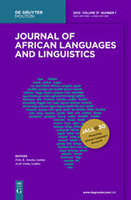
Journal of African Languages and Linguistics
Championing Research in African Languages and CulturesThe Journal of African Languages and Linguistics, published by DE GRUYTER MOUTON, is a premier academic journal dedicated to the study and analysis of the diverse languages spoken across Africa. With an ISSN of 0167-6164 and an E-ISSN of 1613-3811, this journal has been pivotal since its inception in 1979, engaging readers with rigorous research and scholarly articles that span across critical themes in linguistics and language studies. Based in Germany, the journal holds a distinguished Q2 category ranking in the field of Linguistics and Language, according to the latest 2023 metrics, and features a commendable Scopus ranking, positioning it well within the 56th and 52nd percentiles in its respective categories. Although it currently does not provide open access, it is an essential resource for researchers, professionals, and students alike, striving to deepen their understanding of African languages, their structures, and their sociocultural contexts. With a continuously expanding scope and a commitment to advancing linguistic scholarship, the journal remains a significant platform for fostering academic dialogue and promoting innovative research in African linguistics.